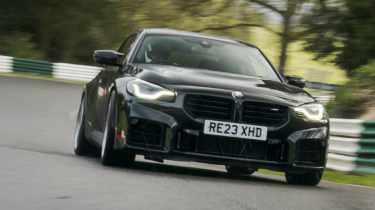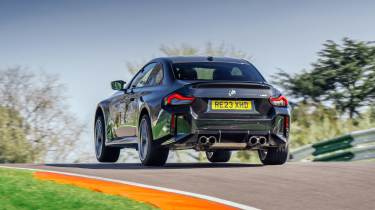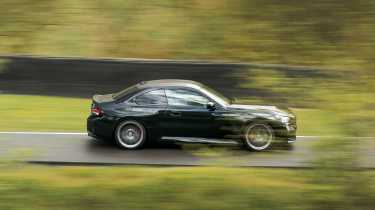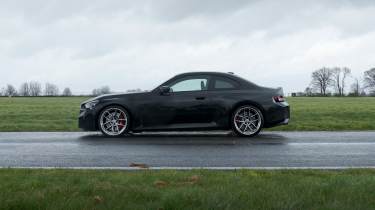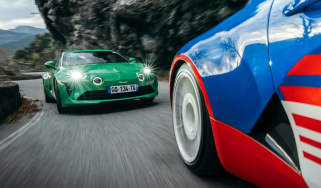Litchfield BMW M2 2024 review: 640bhp tuned M2 tested
Litchfield has given the BMW M2 more power than a Lamborghini Huracán – we try it on track
Litchfield Motors has form with the original BMW M2. Now it’s turned its attention to the new, G87-generation model, introducing a package of tuning options including ECU, exhaust, suspension and more.
The headline figure is 640bhp, the power output for buyers who choose the most potent ECU remap option together with the cat-back exhaust system and an upgraded intake.
That’s a serious step up from the not-slow standard M2, which has 454bhp and 406lb ft of torque in factory spec. Litchfield has worked to make both the power and torque delivery as smooth as possible, however. Torque is slightly reduced in first and second gear but third gear permits full torque: Litchfield has found the car is able to take full power in the dry with standard Michelin Pilot Sport 4S tyres fitted. The M2’s regular, factory-fit traction control and stability control systems are retained, and Litchfield says they work very well with the new jumbo power and torque figures.
To access the M2’s Bosch ECU, Litchfield sends the unit away to Finland-based company FEMTO to be unlocked (the only company in the world that can do it, Litchfield says) and then applies its own tuning. That includes four switchable maps: one retaining the original factory settings and power and torque outputs; one for 95 Octane fuel, producing approximately 590bhp and 530lb ft; one for super unleaded which allows more than 620bhp and 550lb ft; and a restricted-power ‘valet mode.’
More reviews
In-depth reviews
Long term tests
Reviews
- BMW M240i xDrive review – a cut-price M4 or a Golf R rival?
- BMW M235 xDrive Gran Coupe 2025 review – Audi S3 saloon fighter isn’t a full-on M car
- Used BMW M235i and M240i Coupe (F22, 2014 - 2021): review and specs for BMW’s junior M car
- Used BMW M2 Competition (F87, 2018 - 2020) review – modern M car great for hot hatch money
- BMW 230i 2025 review – a BMW coupe of the old school?
Customers can also purchase a Bluetooth interface for their phone, where they can individually alter the amount of torque allowed per gear.
Without changing the exhaust and retaining the original OPF filters, Litchfield claims that an extra 167bhp can still be released with its ‘Stage 1’ ECU tune. At the time of writing (April 2024), the ECU map is priced at £1590 for Stage 1 and £1795 for Stage 2, inclusive of VAT.
The exhaust costs £2676 in stainless steel (by Milltek) or £6292 in titanium (by Akrapovic, which saves 8.3kg). Both give the same amount of power, and retain the M2’s original catalysts and emissions ratings.
So far we’ve only tested the Litchfield-tuned M2 on track, at Cadwell Park during our 2024 Track Car of the Year test in the issue 322, the June 2024 edition of evo magazine. This car is Litchfield’s own development car, in its latter stages of fine-tuning. This is not a track car per se; Litchfield’s focus behind the upgrades is to produce an enjoyable road car with all the power a customer could reasonably want, with no impact on the car’s emissions systems and with more feel and focus than the regular car from a chassis point of view. The track gives us a chance to feel just how potent that power upgrade feels in a safe environment, and also to concentrate on how the suspension upgrades are shaping up as the car nears the end of its development. We hope to test it on the road in the near future.
This car wears lightweight, wider-offset 20-inch HRE wheels (also available as part of Litchfield’s array of tuning options, priced at £5243 with Michelin Pilot Sport 4S tyres; the company says they save around 2.4kg at each corner) and it sits lower on a height-adjustable spring kit (£1495). The wheels fill the arches menacingly, and make the M2 look even wider than it really is. Our test team thought it looks superb: clearly breathed on without being over the top.
I’d be lying if I said I wasn’t slightly intimidated by driving a shortish-wheelbase car with 640bhp but I needn’t have worried. The engine’s delivery really is very smooth and controllable, and all of the M2’s standard electronics, including the how-much-rope-do-you-want, variable-stage traction control remain. (Especially welcome when it began to spot with rain halfway through my stint in the car.)
When the M2 does slide, there’s decent communication through the chassis. Litchfield’s developed the car with fast road use rather than track work in mind but its chassis upgrades aim to give more body control, feel and feedback than the standard M2 – a car evo found lacking in cohesion on track when testing it at Anglesey last year. Litchfield’s height-adjustable spring kit has slightly stiffer spring rates, reducing roll, but retains the original adaptive dampers and their attendant Comfort and Sport modes. It sits a fair bit lower than the M2’s standard, relatively high-riding set-up.
Litchfield also adjusts the wheel alignment for slightly better turn-in, alters the geometry for the lower ride height and upgrades the bushes. At the front, the control arm’s standard rubber bush is replaced with a uniball design with less play. The rear suspension is rose-jointed and there are adjustable rear toe arms for camber, among other alterations. Litchfield says the geometry changes allow the rear suspension to work in a smoother arc, and that despite the higher spring rate that ride comfort at the rear on the road was a priority. The chassis upgrade costs £2010 (and the spring kit £1495 on its own including fitting).
Unsurprisingly, the Litchfield-tuned M2 feels fast in a straight line too. But it’s truly blurted-swearword, can’t-stop-giggling, rocketship-fast. In fact, according to our VBox data, it was one of the fastest cars of all in terms of straight-line speed out of 15 competitors in the Track Car of the Year test (which included some serious machinery). In terms of lap time, it was very quick, too: it clocked a swifter time than the Caterham Seven evo25 edition (based on the 420R) and Alpine A110R, in fact, despite wearing relatively conservative Pilot Sport 4S tyres.
While setting that lap time, evo’s Richard Meaden encountered a little more understeer than some of the other cars in the test. Rear grip in the dry is much better than the standard M2 (although evo tester John Barker found it a little snappy in the wet), and the car’s balance is still being finalised. The chassis upgrades are being fine-tuned with care and the Litchfield suspension kit could represent a notable step on from the regular M2 next time we test the car.
Litchfield anticipates that, as second-hand prices of the G82-series BMW M2 drop and more cars appear on the used market, it may see similar demand as it does with the last-generation M2 Competition – and it often works on one or two of those cars a day for upgrades.
